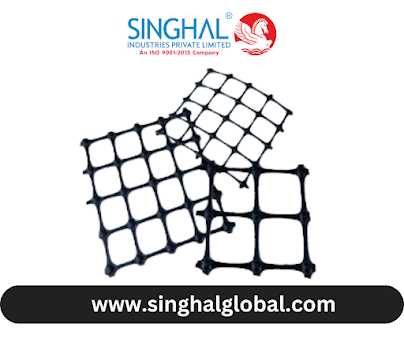Material Quality Assurance: The Impact of FIBC Bulk Bags on Storage Excellence
In today's fast-paced industrial landscape, efficient and secure storage solutions are paramount. FIBC bulk bags, also known as jumbo bags or big bags, have emerged as a game-changer for businesses dealing with large quantities of dry, flowable materials. However, the effectiveness of these versatile containers hinges on the quality of the materials used in their construction. Singhal Industries - Manufacturer of Flexible Packaging Product, a leading Fibc Bag Manufacturer in India renowned for its unwavering commitment to quality and service, understands the critical role material selection plays in ensuring storage excellence.
This blog delves into the impact of material quality assurance on FIBC bulk bags and how Singhal Industries contributes to optimizing storage practices across various industries. We'll explore the key material properties, the benefits of prioritizing quality, and how Singhal ensures consistent excellence in their FIBC bag manufacturing.
Why Material Quality Matters in FIBC Bulk Bags
Fibc Bag Manufacturer are designed to handle a wide range of dry, flowable materials, from sand and fertilizer to chemicals and food products. Their durability, safety, and functionality all depend heavily on the quality of the materials used in their construction. Here's a closer look at some crucial material properties:
- Fabric Strength: The fabric used in FIBC bags needs to be robust enough to withstand the weight and potential stresses of the stored material. High-quality polypropylene fabrics, with their excellent tensile strength and tear resistance, are the preferred choice for reliable bulk bag construction.
- Safe Working Load (SWL): Each FIBC bag has a designated SWL, indicating the maximum weight it can safely hold. Utilizing strong, reliable fabrics ensures the bag maintains its structural integrity and prevents potential tears or ruptures during loading, transportation, and storage.
- UV Resistance: Exposure to sunlight can degrade the fabric over time. High-quality polypropylene fabrics often incorporate UV stabilizers to minimize sun damage and extend the lifespan of the FIBC bag, especially for outdoor storage applications.
- Breathability: Certain materials might be breathable, allowing for moisture vapor transmission. This can be beneficial for hygroscopic materials (those that readily absorb moisture) to prevent condensation buildup within the bag. Conversely, some applications require moisture-proof bags, and material selection would prioritize impermeability.
- Food-Grade Compliance: For storing food-grade materials, Fibc Jumbo Bag and any additives used in the manufacturing process must comply with strict regulations to ensure product safety and prevent contamination.
The Benefits of Material Quality Assurance in FIBC Bags
Prioritizing material quality assurance in FIBC bag production offers a multitude of benefits for businesses:
- Enhanced Safety: Strong, reliable materials minimize the risk of bag tears or ruptures, safeguarding stored materials, workers, and the surrounding environment.
- Product Protection: High-quality materials with proper breathability or impermeability characteristics help maintain the integrity of stored products by preventing moisture damage or contamination.
- Durability and Extended Lifespan: Quality materials ensure the bags can withstand repeated use and harsh storage conditions, maximizing their value and reducing replacement costs.
- Improved Storage Efficiency: Reliable FIBC bags allow for efficient stacking and optimized space utilization in warehouses and storage facilities.
- Peace of Mind: Businesses can be confident that their materials are safely stored and protected with FIBC bags manufactured using high-quality, rigorously tested materials.
Singhal Industries: Setting the Standard for Material Quality in FIBC Bags
Singhal Industries, a leading Fibc Bulk Bag Suppliers, has established a reputation for excellence by prioritizing material quality assurance in their FIBC bag production. Their commitment to this aspect is evident in several key practices:
- Rigorous Material Selection: Singhal meticulously sources high-quality polypropylene fabrics from reputable suppliers. These fabrics are specifically chosen for their strength, UV resistance, and suitability for various applications.
- Stringent Quality Control Measures: Every stage of the production process, from raw material inspection to finished product testing, undergoes rigorous quality checks. This ensures that each FIBC bag meets the company's stringent standards for strength, durability, and safety.
- Compliance with International Standards: Singhal adheres to the highest international standards for FIBC bag manufacturing, including those set by the International Bulk Container Association (IBCA). This guarantees consistency and reliability in the performance of their bulk bags.
- Customization Options: Singhal understands that diverse industries have unique storage requirements. They offer a variety of fabric types, sizes, SWL capacities, and features like liners and discharge spouts to cater to specific application needs.
Frequently Asked Questions for Singhal Industries
What factors should I consider when choosing FIBC bulk bags?
Several factors are crucial when selecting FIBC bags:
- The type and weight of the material you will be storing.
- Whether breathability or impermeability is required for your application.
- The desired safe working load (SWL) for the bag.
- Any specific
.png)

.png)
Comments
Post a Comment